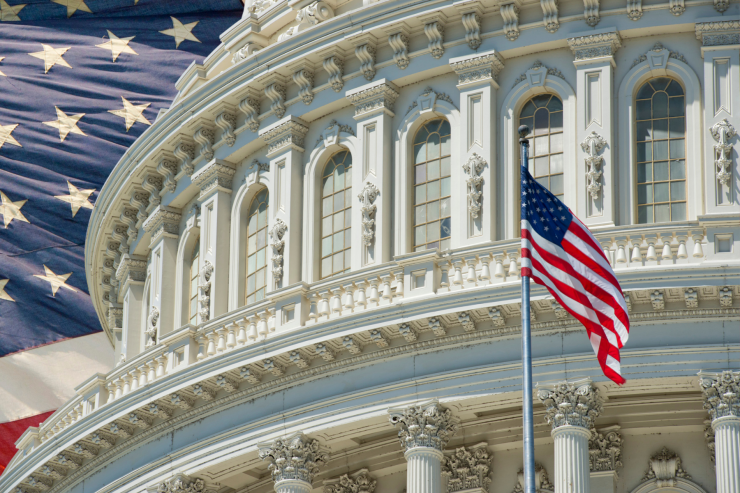More Info: Michael DiMaria | Partner and SW Regional Director | 602-717-3891 | [email protected]
Thanks for your interest in Washington, D.C., and thanks for reading This Week in Washington.
Patrick Robertson reports on the status in Congress of the Biden Administration’s proposal for COVID relief, and well as their plans for infrastructure and immigration reform in “Washington Whispers.” Todd Smith and Congressman Erik Paulsen report on the Administration’s healthcare wish list. Al Jackson provides his monthly defense update, and Ramona Lessen provides an overview of Tuesday’s Senate hearing on the January 6th attack on the Capitol.
We received a significant number of requests asking us to reshare our Total Spectrum Spotlight interview with Senator Mark Kelly, and we are pleased to oblige.
Please mark your calendars – Congressman Erik Paulsen and Patrick Robertson will present a 2021 Outlook from Capitol Hill in a March 3rd webinar from 10:00 AM to 10:30 AM MST as part of the Arizona Chamber’s Virtual Leadership Series. Erik Paulsen served in Congress from 2009 to 2019 where he was a leading member of the tax writing Ways and Means Committee. He was also the chairman of the Joint Economic Committee, co-chairman of the House Medical Technology Caucus, co-chairman of the Digital Trade Caucus, and co-chairman of the Transatlantic Trade and Investment Caucus. Patrick Robertson is a licensed attorney who served as the assistant chief of staff for Senator Jay Rockefeller (D-WV) before beginning a very successful career in the private sector where he uses his vast experience working on issues of tax, energy, telecommunications, trade, and transportation.
To register for this event, visit here or AZChamber.com/events.
We will be back on March 10th for the next issue of This Week in Washington and the next Total Spectrum Spotlight. Stay well.

Steve Gordon, Managing Partner
Washington Whispers
By Patrick Robertson, Total Spectrum Strategic Consultant
Washington is a busy place these days, with a flurry of activity on advancing the Biden Administration’s priorities. Impeachment is behind us and the Senate kicked into full gear this week, with Democratic Senators looking to pass a major Democratic priority while installing key members of the Cabinet and finalizing the organization of the Senate and Senate committees.
With all of this activity, I am going to forego the single-issue column and compile a number of notes to cover a lot of ground. All of these topics really warrant a full column, but each is timely and important, so without further ado let’s look at the first five weeks of the Biden Administration and see what is to come:
- It looks increasingly likely that President Biden will lose his first Cabinet nominee. Senator Joe Manchin (D-WV) announced that he will vote against Office of Management Budget Director-nominee Neera Tanden over her past partisan tweets. Her nomination needs the support of one Republican, and both Republican Senators Susan Collins and Mitt Romney plan to oppose the nominee. Some people believe Neera Tanden could be the proverbial sacrificial lamb who will allow Senators to support other controversial nominees, like those for environmental posts or California Attorney General Xavier Becerra who has been nominated to be the Secretary of Health and Human Services. There are also rumors that Senator Manchin might flex his muscle and oppose more nominees. Ten of the President’s 23 cabinet nominees have been confirmed so far, with more hearings and votes slated this week.
- Senate Majority Leader Chuck Schumer (D-NY) has pledged publicly and in a private event I hosted last week that he will pass the $1.9 trillion COVID relief plan before the extension of enhanced unemployment benefits runs out on March 14. The House is expected to clear their bill Friday and then the Senate will take it up under the budget reconciliation process which requires only 50 votes to pass it. The Senate Parliamentarian ruled today that an increase in the federal minimum wage to $15/hour does not fit within the arcane Senate budget reconciliation procedures outlined by the Byrd Rule. While Senator Manchin and Senator Kyrsten Sinema had announced they do not support this increase, attention will now turn to the liberal wing of the Senate Democratic Caucus to see if they will push for other changes to the bill or try to force an increase into law through new procedural tactics.
- Last week, the White House sent its immigration bill to Congress. Senator Bob Menendez (D-NJ) and Rep. Linda Sanchez (D-CA-38) quickly introduced the legislative text to implement the bill in both Houses of Congress. The bill provides for a pathway to citizenship for undocumented immigrants who entered the country before January 1st of 2021, raises the caps on immigrants from many countries, and provides special treatment for children. It is unlikely the bill will garner enough Republican support to get 60 votes in the Senate and comprehensive immigration reform cannot be accomplished through budget reconciliation where only 51 votes are needed. A bipartisan package is the only path, and that means the President’s bill will be broken into smaller and less sweeping pieces.
- Assuming Senate Democrats stick together and pass the COVID relief package, Leader Schumer has indicated he is looking to move quickly to a second, larger budget reconciliation package that would include infrastructure funding based on the Build Back Better plan from the Biden campaign. Democrats will look to pass a package with traditional infrastructure investment like roads, ports, and airports, new green energy incentives that will work to meet the Administration’s climate goals, tax incentives for infrastructure, and some other economic recovery items. There is a debate about whether to offset this spending or borrow more money which is possible because interest rates are so low. The federal gas tax, which has traditionally provided the money for the Highway Trust Fund, is no longer able to cover the fund so a new financing mechanism must be found. The most aggressive timeline has the House passing its infrastructure bill in March and the Senate doing its work by May. This timetable is unlikely to be met, but it gives a sense of how quickly Democrats would like to move on this issue.
- What about Republicans? Democrats have control of both the Senate and the House, so Republicans have some stark choices. Democrats used reconciliation to pass President Obama’s Affordable Care Act, and Republicans opposed it in lockstep and then used their opposition to their tremendous political advantage in the next midterm election. Will they do the same in 2021? It seems that some Republicans may vote for some of the Biden stimulus plan. But those Republicans who do not vote for the COVID relief bill will have a hard time voting for a larger infrastructure package unless Democrats find a way to pay for it.
- And what about bipartisanship? President Biden campaigned on his ability to work in a bipartisan way, but it appears from his recent statements that he has decided it is not worth waiting for Republicans on his signature priorities. That may change, but for now Democrats appear to be going it alone where they can.
In case you missed it: Spotlight on Senator Mark Kelly
Total Spectrum’s Erik Paulsen interviews Senator Mark Kelly, getting Kelly’s thoughts on his first impressions as a new member of the Senate, his policy priorities, and what to expect soon from the Biden Administration.
Defense Update
By Al Jackson, Strategic Consultant to Total Spectrum
With Democrats controlling both the House and Senate, progressives from the party will continue their agenda to cut defense spending by as much as 10% or more. Because of the close margins of control, the progressive wing of the Democratic party will have some influence. They’re aided in their efforts by incoming Senate Committee on Budget Chairman Bernie Sanders (I-VT). However, the odds are against them, as the majority of Republicans and some Democrats will oppose any efforts to slash the defense budget in favor of more COVID-19 relief and domestic programs including healthcare and infrastructure spending.
Representatives Mark Pocan (D-WI) and Barbara Lee (D-CA), who founded and co-chair a caucus dedicated to cutting the defense budget, intend to lobby their colleagues to prioritize spending on COVID-19 relief instead of national security. Last session, they offered an amendment to the National Defense Authorization Act to impose an across-the-board 10% cut to the bill’s budget, approximately, $74 billion. A similar proposal was offered by Senators Sanders (I-VT), Warren (D-MA) and others. The measures were soundly defeated in both chambers, as the Senate version only mustered 23 votes. Unfortunately, the amendment won the support of Senate Majority Leader Chuck Schumer (D-NY) and Senator Dick Durbin (D-IL), who chairs the Defense Appropriations Subcommittee.
While we await the Fiscal Year 2022 budget from the administration, let’s take a closer look at the new leadership of the various defense-related committees of jurisdiction.
The Senate Committee on Armed Services looks much different in the 117th Congress, as more junior members are now leading important subcommittees. For instance, Senator Tammy Duckworth (D-IL) is taking over the Airland Subcommittee, replacing Senator Angus King (I-ME). Newly elected Senator Mark Kelly (D-AZ) is the new chair of the Emerging Threats and Capabilities Subcommittee, which has oversight for the Pentagon’s research and development, special operations, intelligence and counterterrorism efforts.
Senator Martin Heinrich (D-NM) now leads Strategic Forces, leapfrogging Senator Angus King (I-ME). This subcommittee oversees nuclear weapons, missile defense, space programs and arms control. As a result of the new rule in the Democratic caucus preventing chairs of “A” committees such as Appropriations and Armed Services from claiming subcommittee chairmanships until all of a committee’s Democrats get a chance to claim one, more junior senators have garnered greater influence on these committees as subcommittee chairpersons. Senators Richard Blumenthal (D-CT), Jeanne Shaheen (D-NH), and Elizabeth Warren (D-MA) were passed over by more junior members.
Senator Duckworth, an Army helicopter pilot wounded in Iraq, and Senator Kelly, a Navy pilot and a retired NASA astronaut who is up for reelection in 2022, will now have more visibility.
Senator Jon Tester (D-MT) will chair the Senate Appropriations Defense Subcommittee. Considered a moderate, Senator Tester also chairs the Senate Committee on Veteran’s Affairs. Malmstrom Air Force Base is located in Montana and houses the Minuteman III intercontinental ballistic missile. Counter to Senator Tester’s support for that program, the Air Force plans for the Ground-Based Strategic Deterrent (GBSD) to replace the Minuteman missile. The GBSD is being developed by Northrop Grumman Corporation and has an estimated cost of $100 billion to build the weapon for fielding in 2029. Montana ranks 46th in revenue generated from defense and its’ largest defense contractor is S&K Technologies, a global professional services company that is tribally owned and based in St. Ignatius. The subcommittee’s ranking Republican member will be Senator Richard Shelby (R-AL), who recently announced his intentions not to seek reelection in 2022. Alabama receives 7% of its gross domestic product from the defense industry, with more than 300 aerospace and defense companies based there. Senator Shelby will also serve as ranking member of the full Appropriations Committee opposite Chairman Patrick Leahy (D-VT).
In the House of Representatives, Congresswoman Betty McCollum (D-MN) will chair the Defense Appropriations Subcommittee and Ken Calvert (R-CA) will serve as ranking member. Congresswoman Rosa DeLauro (D-CT) chairs the full Appropriations Committee with Kay Granger (R-TX) as ranking member. Congressman Adam Smith (D-WA) retains the chairmanship of the House Committee on Armed Services.
Earlier this month the Senate confirmed Kathleen Hicks as Deputy Defense Secretary, making her the first woman to be confirmed by the Senate to that position. Hicks was Deputy Undersecretary of Defense in the Obama administration and more recently, she led the international security program at the Center for Strategic and International Studies, further highlighting her more academic career. Hicks is expected to play a major role in policy decisions. Defense Secretary Lloyd Austin’s service on the Raytheon Technologies Board of Directors will lead to his recusal from decisions concerning the company, which will now fall to Hicks. During her confirmation hearing, she commented that, in a year of likely flat defense spending, the budget could be trimmed without sacrificing national security.
A Health Care Trifecta
By Todd Smith, Total Spectrum Partner and Chairman, Georgia Group and Congressman Erik Paulsen (2009-2019), Total Spectrum Strategic Consultant
Along with addressing COVID relief and passing an economic recovery package, health care is certainly a top tier issue for the Biden administration and Congress. As such, President Biden and the Democrat-controlled Congress are planning to lump them all together into one legislative package which the House of Representatives will vote on this week. As mentioned in past issues of This Week in Washington, a unique legislative process known as budget reconciliation is being used to allow the Senate to pass this package with a simple majority vote, and the Vice President able to cast a tie-breaking vote, instead of needing 60 votes to end debate.
President Biden and the Democrats in Congress will attempt to include as many of their health care priorities into the budget reconciliation package as they can knowing they don’t need Republican support. However, some items on their “wish list” won’t make it into the final bill due to restrictions on issues permitted to be included under reconciliation rules, as well as a lack of unanimity within the Democrat party. More on these issues later.
Before we review what is included in the budget reconciliation package, let’s discuss President Biden’s executive orders which highlight the first health care priorities for the new administration. For the most part these executive orders direct health care agencies to review and reverse Trump-era rules.
One executive order directs agencies connected to Medicaid programs to review all regulations, orders, guidance documents, and policies in order to determine whether it makes high-quality healthcare accessible and affordable for all Americans. As a result, the Department of Health and Human Services (HHS) has already begun to unravel the Trump Administration rule on Medicaid work requirements.
Another executive order asks the administration to quickly review Trump administration actions and alter or rescind rules and guidance which undermine the Affordable Care Act (ACA). Similarly, another executive order allows HHS to announce a special enrollment period of three months (February 15th to May 15th) for individuals to sign up for insurance under the ACA. This also includes $50 million for advertising and outreach.
Still another executive order rescinds a Trump administration rule which allowed states to extend the duration of short-term health plans, expand Association Health Plans, and let workers use health reimbursement accounts to purchase coverage in the exchange.
These are just a few of the executive orders which President Biden has issued regarding health care matters. Like his predecessor, President Biden is not afraid to use his pen to push things through. Hence, we can expect more executive orders to come.
On the legislative front, staff from both parties are meeting with the Senate parliamentarian to argue their case as to why a legislative provision should or shouldn’t be included in the budget reconciliation package based on the unique Senate budget rules. Below are several notable health care related provisions which are included in the budget reconciliation package, subject to a Senate parliamentarian ruling:
- Would cover state Medicaid and CHIP programs’ COVID-19 vaccine costs for up to a year after the end of the public health emergency.
- Includes incentives for those states that haven’t done so to expand Medicaid by allowing for a two-year, 5% bump to the federal government’s portion of Medicaid paid for traditional beneficiaries when hold-out states expand program eligibility.
- Cover 85% of COBRA premium costs for people who lost workplace coverage during the pandemic. NOTE: Of all the health care related provisions, this one could be stricken.
- Enhance Affordable Care Act tax credits for people earning below 400% of poverty level and limit premium contribution to 8.5% of income for any eligible exchange consumer. Allow anyone receiving unemployment benefits in 2021 to get the maximum ACA subsidy.
- Remove the cap on inflationary drug rebates in Medicaid. Medicaid requires a minimum 23% rebate on brand drugs. Companies pay an additional inflation rebate when they raise prices faster than inflation. This inflationary rebate is currently capped at 100% of the average manufacturer price.
With Democrats controlling both the House of Representatives and the Senate (albeit by a narrow margin) and President Biden in the White House, there are certainly other health care related items that will be brought forward for consideration this Congress and in the President’s first term. Most notable will be a government-run public insurance option versus ‘Medicare for All.’ Other likely initiatives include lowering the age for Medicare eligibility, increasing ACA subsidies, drug pricing reforms, and Medicare drug negotiations. All of these issues have their supporters and detractors, which means making it to President Biden’s desk for a signing ceremony is an uphill climb.
One thing is for sure, President Biden has a pen, and he will use it one way or another.
What you need to know about the $1.9T Coronavirus Relief Package
What you need to know about Biden’s Tariff Dilemma

What you need to know about Budget Reconciliation and Pandemic Aid

Biden on track to hit Covid-19 vaccination target

2020 sets record with new utility-scale solar installations

How an arctic blast took down an ill-prepared Texas power grid

Hearing Report
By Ramona Lessen, Executive Director, Total Spectrum
The Committee on Homeland Security and Governmental Affairs and the Committee on Rules and Administration Joint Committee Hearing Examining the January 6th Attack on the U.S. Capitol
Tuesday, February 23, 2021; 10:00 AM
To view a livestream of the hearing please click here.
Opening Statements:
Senator Amy Klobuchar (D-MN), Chairwoman
Senator Roy Blunt (R-MO), Ranking Member
Witnesses:
Paul D. Irving
Former Sergeant at Arms (2012-2021)
U.S. House of Representatives
Steven A. Sund
Former Chief of Police (2019-2021)
U.S. Capitol Police
Michael C. Stenger
Former Sergeant at Arms and Doorkeeper (2018-2021)
U.S. Senate
Robert J. Contee III
Acting Chief of Police
District of Columbia
Washington, DC
Hearing included a statement by
U.S. Capitol Police Captain Carneysha C. Mendoza
Congressional Hearing and Markup Calendar
Monday, February 22
- 9:30 a.m. Senate Judiciary Committee hearing on the nomination of Merrick Garland to be attorney general of the U.S.
- 1 p.m. House Budget Committee virtual markup of Democrats’ relief package.
- 5:30 p.m. Senate Rules and Administration Committee business meeting to organize for the 117th Congress.
Tuesday, February 23
- 9:30 a.m. Senate Armed Services Committee hearing on emerging technology’s impact on national security. Microsoft President Brad Smith, among others, testifies.
- 9:30 a.m. Senate Energy and Natural Resources Committee hearing on the nomination of Rep. Deb Haaland (D-N.M.) to be Interior secretary. The nominee testifies.
- 10 a.m. Senate Banking, Housing and Urban Affairs Committee virtual hearing on monetary policy. Federal Reserve Board Chair Jerome Powell testifies.
- 10 a.m. Senate Finance Committee hearing on the nomination of Adewale Adeyemo to be deputy Treasury secretary. The nominee testifies.
- 10 a.m. Senate Health, Education, Labor and Pensions Committee hearing on the nomination of Xavier Becerra to be secretary of Health and Human Services. The nominee testifies. More from our Alice Miranda Ollstein.
- 10 a.m. Senate Homeland Security and Governmental Affairs Committee and Senate Rules and Administration Committee joint hearing on the Jan. 6 attack on the Capitol.
- 10 a.m. Continuation of the Senate Judiciary Committee hearing on Garland’s nomination. The nominee testifies.
- 10 a.m. House Appropriations Financial Services Subcommittee virtual hearing on IRS oversight. IRS Commissioner Chuck Rettig testifies.
- 10:30 a.m. House Energy and Commerce Oversight and Investigations Subcommittee virtual hearing on Covid vaccine availability. Executives from AstraZeneca, Johnson & Johnson, Moderna, Novavax and Pfizer testify.
- 2 p.m. House Rules Committee virtual business meeting to prepare H.R. 5 (117), the Equality Act, and H.R. 803 (117), the Colorado Wilderness Act, for the House floor.
- 2:30 p.m. Senate Intelligence Committee hearing on the SolarWinds hack. Read more from our Martin Matishak.
Wednesday, February 24
- 9:30 a.m. House Appropriations Defense Subcommittee virtual hearing on DoD’s fiscal 2022 budget.
- 9:30 a.m. House Homeland Security Committee virtual hearing on the Covid-19 pandemic.
- 10 a.m. House Oversight and Reform Committee hybrid hearing on the U.S. Postal Service. Postmaster General Louis DeJoy, among others, testifies.
- 10 a.m. House Appropriations Financial Services Subcommittee virtual hearing on the judiciary’s fiscal 2022 budget.
- 10 a.m. House Appropriations Labor-HHS-Education Subcommittee virtual hearing on public health infrastructure.
- 10 a.m. House Appropriations Legislative Branch Subcommittee virtual hearing on fallout from the Jan. 6 attack on the Capitol.
- 10 a.m. House Financial Services Committee virtual hearing on monetary policy. Powell testifies.
- 10 a.m. Senate Homeland Security and Governmental Affairs Committee business meeting to vote on the nomination of Neera Tanden to be director of the Office of Management and Budget and on the rules of procedure of the committee. More from our Tyler Pager.
- 2:30 p.m. Senate Small Business and Entrepreneurship Committee business meeting to vote on the nomination of Isabella Casillas Guzman to be administrator of the Small Business Administration.
- 10 a.m. House Foreign Affairs Committee markup of the Department of State Authorization Act of 2021 and the Cyber Diplomacy Act, among other bills.
- 10:15 a.m. Senate Environment and Public Works Committee hearing on investing in transportation.
- 1:30 p.m. House Foreign Affairs Committee virtual hearing on American diplomacy.
- 2 p.m. House Appropriations Military Construction-VA Subcommittee virtual hearing on service members’ exposure to PFAS.
- 2 p.m. Senate Finance Committee hearing on Becerra ’s nomination. The nominee testifies. More from our Alice Miranda Ollstein.
- 2:30 p.m. Senate Indian Affairs Committee hearing on native communities’ priorities for the 117th Congress. 628 Dirksen.
- 4 p.m. Senate Veterans’ Affairs Committee hearing on vaccines for veterans.
Thursday, February 25
- 10 a.m. Senate Finance Committee hearing on the nomination of Katherine Tai to be U.S. trade representative. The nominee testifies.
- 12:30 p.m. House Agriculture Committee hearing on the impact of climate change on agriculture and forestry.
- 2 p.m. House Appropriations Energy-Water Subcommittee virtual hearing on climate innovation.
- 10 a.m. House Appropriations Legislative Branch Subcommittee virtual hearing on security failures of the U.S. Capitol Police and House Sergeant at Arms.
- 10 a.m. House Science, Space, and Technology Committee virtual hearing on the impact of Covid-19 on research.

This e-newsletter is produced by Total Spectrum/Steve Gordon and Associates and the Arizona Chamber of Commerce and Industry. The views expressed herein may include subjective commentary and analysis that are the views of the editors and authors alone. Information in this e-newsletter is obtained from sources believed to be reliable, but that cannot be guaranteed as independently investigated or verified. Information in this e-newsletter is not an endorsement, advertisement, recommendation, or any type of advice; political, legal, financial or otherwise. For questions about the content of this e-newsletter, please contact the Arizona Chamber of Commerce and Industry.


















Add comment